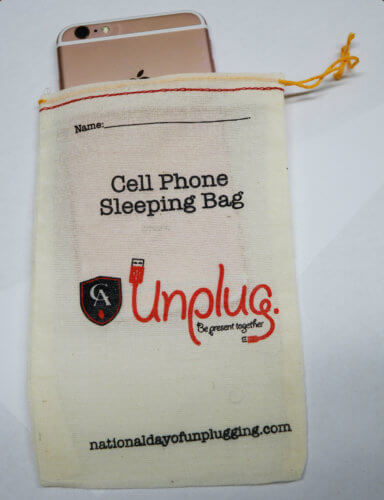 The other day I was rehabbing my knee and my physical therapist said, “Look out! Your phone is about to fall out of your pocket.” I replied, “Good. I hope it breaks.” There are few objects I dislike as much as my phone. At one point not too long ago, I loved my phone. I could listen to music, connect with friends, read the news, take photos, and accomplish professional tasks, all on the run. It was just this magical machine! But, I have found that being connected all the time is not all that it is cracked up to be.
The other day I was rehabbing my knee and my physical therapist said, “Look out! Your phone is about to fall out of your pocket.” I replied, “Good. I hope it breaks.” There are few objects I dislike as much as my phone. At one point not too long ago, I loved my phone. I could listen to music, connect with friends, read the news, take photos, and accomplish professional tasks, all on the run. It was just this magical machine! But, I have found that being connected all the time is not all that it is cracked up to be.
I quit all social media last year and have slowly weaned myself from checking the news and emails too often. Now, I reserve time during the day to respond to emails in a 30-minute session. It’s more efficient and allows me to focus on what is presently before me. If I didn’t run a school and wasn’t thinking about student safety every minute of the day, there would be a good chance I would get rid of my cell phone altogether. Just quitting social media—and I was a light user—has freed up head space, helped better focus my attention, and helped me be more reflective about my life. I am not distracted by negative partisan conversations or hatred that exists on the Internet. I also find that I can be present and live more in the moment.
This Friday, a number of Upper School students are working together to challenge the rest of our school community to unplug and put away their phones. They have created “Face-to-Face Friday,” and are joining a national day of being “unplugged.” School-wide, we’ll be handing out cell phone “sleeping bags” for students and adults to put their phones away.
I encourage everyone in our community to do a mini-phone detox. See if you can manage. I bet you can, and I bet you will find, after getting over the initial compulsion to check what you think you’re missing, that you really haven’t missed that much at all.
I have gotten into Nick Bilton’s Vanity Fair podcast called “Inside the Hive,” which often reports on the tech industry. Periodically, he will rail on the dangers of this technology and note how destructive it has been for our democracy and our personal lives. I have been struck by how he has called out how these devices and apps have been purposely made to be addictive. He once interviewed Steve Jobs as a New York Times reporter and learned that Jobs limited his children’s access to the same devices he was getting the rest of American addicted to.
In another article, Wired.com reporter Adam Alter wrote, “Chris Anderson, the former editor of Wired, enforced strict time limits on every device in his home, ‘because we have seen the dangers of technology firsthand.’ His five children were never allowed to use screens in their bedrooms. Evan Williams, a founder of Blogger, Twitter, and Medium, bought hundreds of books for his two young sons, but refused to give them an iPad. And Lesley Gold, the founder of an analytics company, imposed a strict no-screen-time-during-the-week rule on her kids. She softened her stance only when they needed computers for schoolwork.”
Students, if you are dubious about this, I encourage you to read those attached links and then read this article in the New York Times, Do Not Disturb: How I Ditched My Phone and Unbroke My Brain. The author Kevin Roose tracked his screen time numbers and found that he was looking at his phone for more than five hours a day and picked up his phone to check it 101 times a day. According to his article, this is about twice as much as the average American adult. But, get this: Common Sense Media says that most teens are online nine hours a day! This article is all about his efforts to break his addiction to his phone, but he points out a number of interesting facts. For example, did you know that studies have demonstrated that those who don’t charge their phones near their beds are happier than those who do? Over the course of several days and weeks, Kevin rewired his brain to help him have more focus and feel rejuvenated.
So, here’s our challenge: join our students and put away your phones on March 1. See if you can. If it works, try it out over the weekend. Learn to engage with those around you. You might find you will be bored at times. But, that’s ok. Good stuff can happen when we try to find solutions to boredom. And, think of what you could do with nine hours—engaging with real people and the real world.